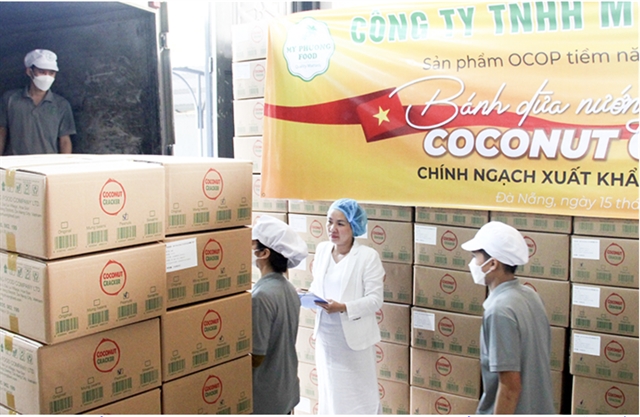 Society
Society


|
| Sesame coconut cakes of Mỹ Phương Food Company in Hòa Sơn Commune of Hòa Vang District, Đà Nẵng City exported to China. — Photo courtesy of Đà Nẵng City's Information Portal |
HÀ NỘI — Farm produce under the "One Commune One Product" (OCOP) programme has gradually become popular with domestic consumers in recent years.
But to export, branding and trade promotion for the products need to be implemented methodically by businesses, co-operatives and relevant ministries and local governments.
OCOP is a national programme that seeks to facilitate the development of regional agricultural specialties and rural tourism.
According to the Ministry of Agriculture and Rural Development (MARD), the country has a total of 9,500 OCOP products, of which 65.5 per cent were recognised at the 3-star standard but only 2 per cent of the products got the 5-star standard.
The OCOP programme has been widely developed in many regions of the country, focusing on improving quality as well as diversifying product designs, thereby promoting the advantages of each locality.
Notably, instead of producing raw products, recently many businesses and cooperatives have turned to green, clean, and even refined products to catch up with consumption trends, thus creating a boost in exports for brands.
Along with attaching “stars” to OCOP products, currently, the trade promotion of OCOP products is being implemented by ministries, branches and localities.
OCOP products have entered the domestic supermarket system, retail distribution channels and chain stores.
According to the assessment of the Việt Nam Retailers’ Association, after nearly five years of implementing the programme, consumers are now very familiar with the OCOP name.
Not stopping at the domestic market, producers of OCOP products also seek to penetrate markets abroad.
Trần Thanh Nam, the MARD deputy minister, said that the European Craft Fair being held in December in Italy will be a great opportunity for Vietnamese enterprises to promote their products, expand markets and reach new customers.
Việt Nam’s OCOP products are ready to participate at this fair, Nam said.
Currently, the MARD has also guided its agencies to notify localities to prepare 5-star OCOP products for display and introduction at the fair, he said.
In order to develop the system and expand the consumption market, many Vietnamese enterprises have found a way to "go abroad" for their OCOP products.
For example, in mid-March this year, a shipment of seven 20-foot containers of 200,000 sesame coconut cakes by Mỹ Phương Food Company in Hòa Sơn Commune of Hòa Vang District, Đà Nẵng City were exported to China.
This was the first OCOP product of Đà Nẵng City officially exported to this market.
Since then, the cakes have been exported to the US, Japan, South Korea and Laos.
Along with the advantages of free trade agreements (FTAs), after attaching stars to the OCOP products, businesses have received support in product and trade promotion in domestic and international markets by ministries, departments and local governments.
This support is a great motivation for businesses to further invest into OCOP products.
OCOP producers recognise that the 5-star standard is the "golden passport" to export.
In order to be awarded 5 stars, the product must go through a very rigorous review, appraisal and evaluation process.
To get more of these "golden passports", recently, the MARD held a meeting of the central-level OCOP product evaluation and classification council for 2023.
Out of 85 dossiers submitted by localities, 19 products gained 5-star recognition, including products of coconut flower honey, coconut flower sugar of Trà Vinh FARM Company and dried coconut of Cầu Kè Company in Trà Vinh Province; and Phú Quốc Khải Hoàn fish sauce of Khải Hoàn Company in Kiên Giang Province.
The exporting of OCOP products still faces many obstacles due to low output and weak marketing.
“One of the weaknesses is that the producers have not yet clearly shown the characteristics of OCOP products,” said Nam. “Each OCOP product needs to have an attractive ‘story’.”
“And in the process of developing OCOP products, many entities have not yet built up standards of raw material areas. Many products do not have intellectual property and product quality has not been associated with trademarks and brands,” the deputy minister said.
According to experts, in order to enable exporting, each OCOP product must have local characteristics and good quality.
However, to have the distinct values of OCOP products, producers need to be supported.
To develop 5-star OCOP brands in the international market, businesses and co-operatives need to pay attention to sustainability factors from the start of production because this is an inevitable trend, said the deputy minister. — VNS